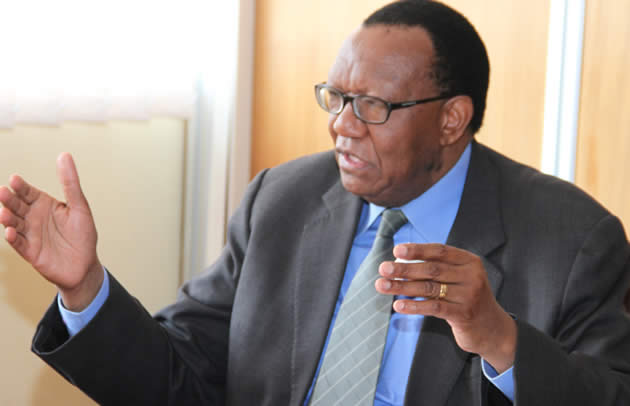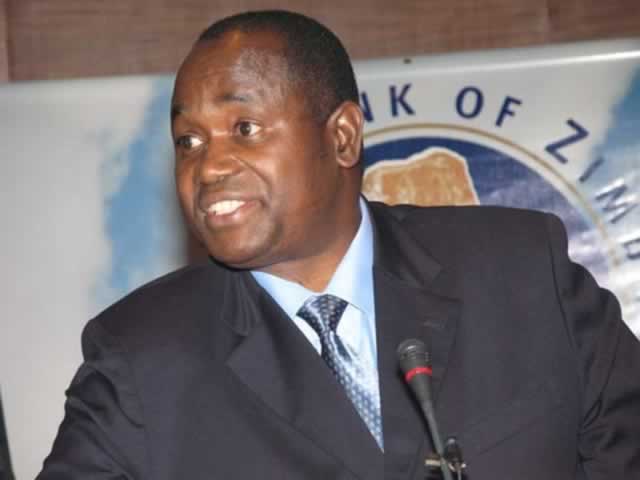1128: We end our live updates here.
1117: “To the business community, we will benefit the economy if we work together with Government.” Malaba
1112: President of the Bankers Association of Zimbabwe, Sam Malaba, is now making the closing remarks.
1108: “We cannot stand and fold our hands in desperation. We must never put our eggs in one basket. We need to work in unison to unlock our potential.”
1106: “We banned the export of raw gold and in the first six months Fidelity has managed to refine 8.5 tonnes of gold.”
1105: “Antwerp and Dubai have raised our price to $76 per carat”
1103: “We are now trying to nurture domestic industry. We don’t want to become a warehouse for other countries.”
1101: “I receive taxes from the formal sector but not the informal. As far as pay as you earn, I don’t get that. The policies are ours.”
1059: “We cannot ignore the informal sector…if we do, it is at our own peril. With flexibility the core of business is maintained.”
1056: “Our wage bill is 76% of whatever we receive. 76% goes towards paying bills and none towards operations. Its not good.”
1054: “If we have got that greater transparency it will help. We are going to extend this to our tollgates. That alone will see our revenue doubling. You must go beyond suspicion to go beyond corruption.”
1052: “Those who sell debts are not the debtors, they are creditors. If they tell us that they have sold the debts then I will be quite happy. If they sell the debts then we should not remain debtors otherwise we should reschedule. The briber and bribed have benefited and will not report to the police. Corruption is therefore very hard to investigate. My approach is that we need greater transparency in what we do.”
1048: “I hope that at the beginning of the year we will have small change and brings down prices. If the private sector is supported it widens my revenue. I need that capacity.”
![From left: Zimpapers Chief Operating Officer and Editor In Chief, Pikirayi Deketeke, Minister of Information,Media and Broadcasting Services, Prof Jonathan Moyo and Cde Patrick Zhuwawo]()
From left: Zimpapers Chief Operating Officer and Editor In Chief, Pikirayi Deketeke, Minister of Information,Media and Broadcasting Services, Prof Jonathan Moyo and Cde Patrick Zhuwawo follow proceedings.
1047: “Let’s not shout too much about corruption where it does not exist. It will despirit those who are not corrupt. I don’t want to make accusations where there is no basis. The multi currency regime is here to stay. I am not a reckless finance minister. If there is no output and no foreign currency reserves, there is no point in bringing a local currency.”
1041: “It’s not just for the Government but for the private sector as well. We might get softening of the heart sooner rather than later.” Chinamasa
1040: Chinamasa is now speaking “These efforts are all to look for friendship nomatter how hard it may be. Unless we do so we will not have access to capital banks. It is very important that as a country we should look everywhere in order to move forward.
“Maybe the IMF is saying you are not dying but psychologically you have convinced yourself that you are dying. We have the capacity if we put our house in order. We are not a basket case.”
1035: “I’m really impressed by the discussions we have had. It makes me only hope well for the future that this is a start of a beautiful friendship.” Fanizza.
1033: “As long as you live within the quantitative targets, it’s okay with us. How to spend and how to raise revenue is up to the authorities, not us.” Fanizza
1022: “If you want to really get the process moving, you need to build consensus out there” Fanizza
1019: “I see highly qualified and skilled people in Zimbabwe.The fund deals with anybody, with any country despite who is in power. The last decision is made by our shareholders.”Fanizza
1016: Minister of SMEs Sithembiso Nyoni “Zimbabwe is not all doom and gloom.”
1013: Deputy Information minister, Supa Mandiwanzira comments “Zimbabwe is the only country to be described b y a shareholder of IMF as an extraordinary threat to America. The political situation in this country has been a major drawback.”
1010: “We cannot sell the debt but what we can do is find a debt solution and find support which your debt can be rescheduled.” Fanizza
1008: “It’s not Government but the market that defines what is the comparative advantage.” Fanizza
1007: “The quality of the health sector in Zimbabwe should be improved.” Fanizza starts answering.
1004: Question: “Are we fighting corruption?, if not, what is the problem?”
1001: Question: “What does the IMF see as Zimbabwe’s comparative advantages?”
1000: “Become part of the emerging Africa. Don’t think you are special. Businesses have to compete and you have to compete and show how good you are. The IMF does not provide support to the private sector. We lend to governments and central banks. We are not a bank. There is a sector that is part of the IMF but I cannot answer for them.”Fanizza
0957: Mr Fanizza responds to a question “The concept of conditionality imposed on Zimbabwe is not there. There subsidies but there are other kinds of subsidies that we as the IMF cannot support. I have heard about the need of trade protection. We believe in free trade and it has shown to help economies move. You are not China and you cannot replicate China’s model of growth.”
0946: It’s now time for the Question and Answer session.
0943: “Zim Asset spoke of an economy which had a history. The problem we have, not only in Zimbabwe but in Africa, is like driving a car looking in the rear view mirror. By holding public auctions in Zambia, the Government was able to raise revenue from Gemstones.”
0940: “Every investor says they want to know about the nature of their investment. Targeted subsidies have been shown to work around the world. Where is Zimbabwe with targeted subsidies?”
0938: “The question is why are the investors not coming here” Mongayi
0937: The final speaker is former World Bank country manager Mr Nginya Mongayi.
0927: “I would like to thank Zimpapers for opening the floor for such dialogue. We as Zimbabweans should learn to spend what we have and not spend beyond our means. We are going to emerge victorious.”
![Mr Goddard]()
Mr Goddard
0922: “Zimbabwe was rated 5th on the World Economic Forum in terms of mathematics. Although we have outdated infrastructure, we have what we need to restore the country.”
0920: “It would be hugely beneficial for Zimbabwe to mend our relationships around the world.”
0918: “We need to carefully evaluate the partners that are going to help us achieve our goals.” Goddard
0913: The next respondent is businessman Ross Goddard.
0911: “How can an economy be capitalised when we open our frontiers. If you overspend in the right areas that creates a positive domino effect then there is nothing wrong with that.”
![Mr Mandiwanza]()
Mr Mandiwanza
0907: “We are under no illusion that IMF will bring a bag of money into Zimbabwe” Mandiwanza
0905: One of the respondents for the morning Antony Mandiwanza, CEO of Dairibord is now addressing the meeting.
0859: “Zimbabwe faces formidable financial obstacles but sound policies can help.”
0858: “The IMF cannot extend funds to Zimbabwe until it runs its financial arrears”
![Mr Fanista]()
Mr Fanizza
0856: “Zimbabwe cannot enjoy financial benefits because of financial arrears” Fanizza
0853: Mr Domenico Fanizza representing the IMF is now addressing the meeting.
0852: “Zimbabwe’s relationship with the IMF should be one of judicial manager and creditor not liquidator and creditor. IMF should not watch Zimbabwe collapse”
0847: “The private sector is not under sanctions so I do not understand why the IFC is not helping. Is it a punitive measure?”
0845: “The private sector debt of $1.9 billion is being serviced as we speak. I don’t fix things which are not broken. So what is stopping the IFC from aiding our private sector”
0843: “IMF should help us nurse this economy to be what it used to be and what it should be” Chinamasa
0837: “As a member of IMF and World Bank we are entitled to support and borrowing. But because of certain challenges we cannot access fresh credit” Chinamasa
![Minister Chinamasa]()
Minister Chinamasa
0831: The Herald business breakfast has started. After welcome remarks and introductions by moderator Busisa Moyo Minister Chinamasa is now giving his remarks.




















